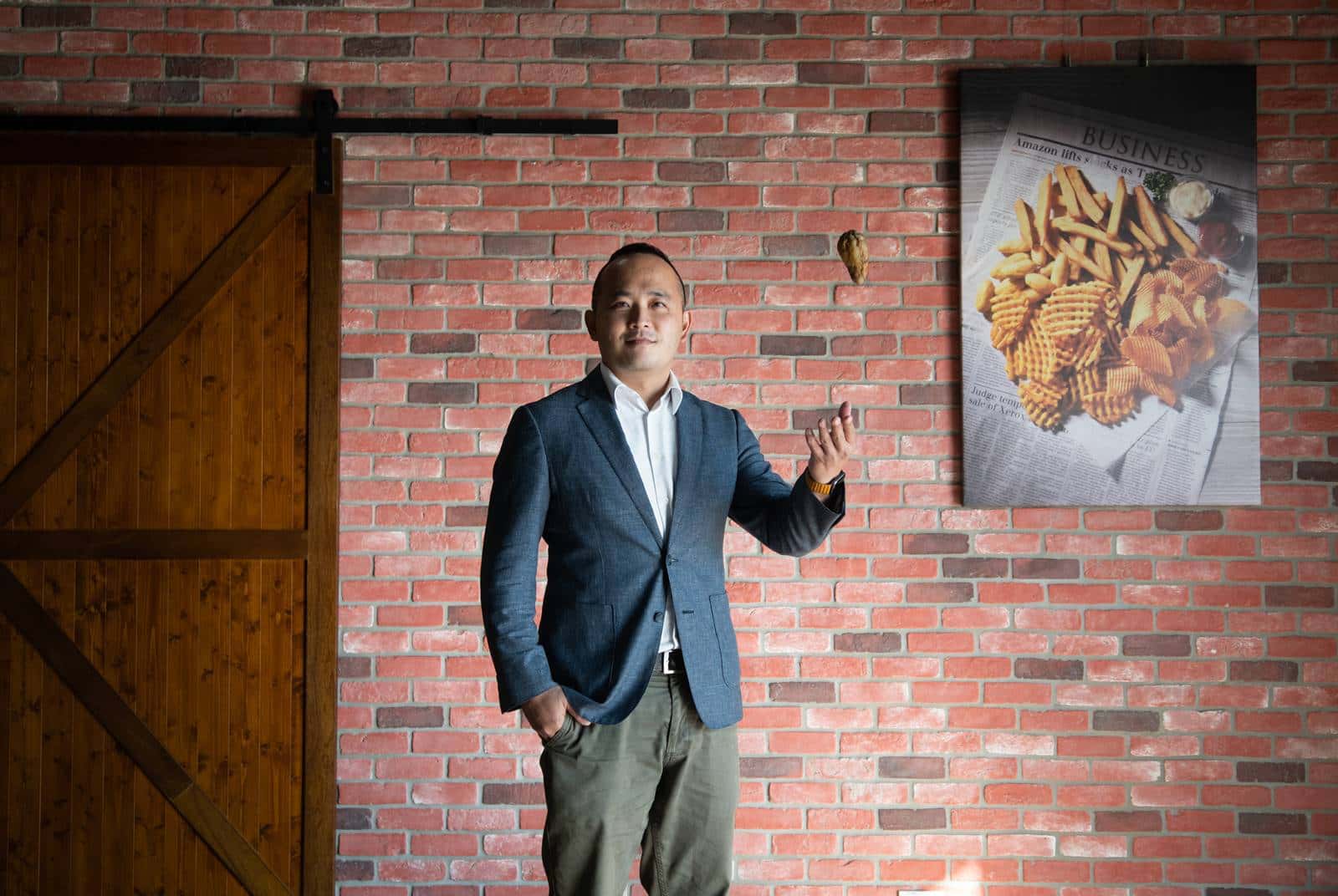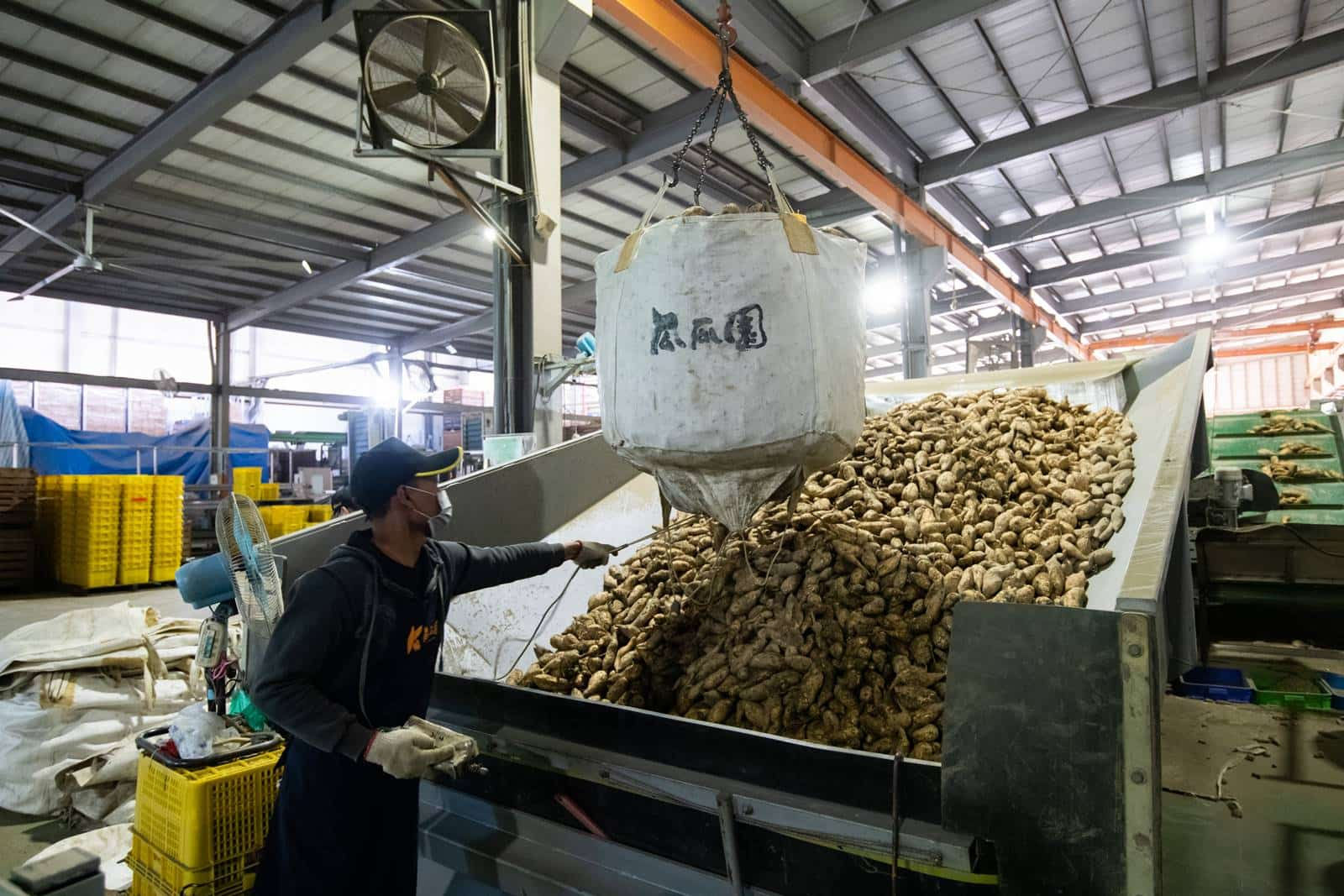How Taiwanese baked sweet potatoes conquered Japanese supermarkets

Source:Ming-Tang Huang
Baked sweet potatoes, a traditional street food in Taiwan that is also sold at 3,700 convenience stores across the island, have now made it into one of Japan’s oldest supermarket chains. How did Jacky Chiu, general manager of Taiwan’s leading sweet potato processing company K.K. Orchard, manage to convince notoriously picky Japanese customers?
Views
How Taiwanese baked sweet potatoes conquered Japanese supermarkets
By Chen-kang KangFrom CommonWealth Magazine (vol. 741 )
Tainan’s Xinhua District, a major sweet potato-growing area, is also home to the largest sweet potato processing plant in Asia. The five-story factory, an investment of NT$800 million, boasts fully automated production lines for frozen sweet potato fries in various shapes and colors. K.K. Orchard exports its offerings, which also include baked sweet potatoes, fried sweet potato balls, and various sweet potato snacks, to more than ten countries. Lately, the company has been flooded with orders as fast-food chains, hit by a pandemic-related potato shortage, look for alternatives.
K.K. Orchard evolved from humble beginnings selling baked sweet potatoes from a street-side truck more than 40 years ago. Today, the company produces 70 percent of all frozen sweet potato fries sold in Taiwan. The 20 million baked “hot-selling sweet potatoes” that the Family Mart convenience store chain sells per year are also sourced from K.K. Orchard. Although sales registered a 10-percent decline last year due to the coronavirus pandemic, annual revenue still reached NT$700 million. Surely, K.K. Orchard deserves the moniker “sweet potato kingdom”.
General Manager Jacky Chiu has reason to believe that his kingdom will continue to grow.
 (Source: Ming-Tang Huang)
(Source: Ming-Tang Huang)
Last year, K.K. Orchard for the first time sold its baked sweet potatoes and sweet potato fries in Japan at the 129 stores nationwide of Ito Yokado, one of Japan’s oldest supermarket chains. More than 10 million sweet potato balls are sold at Japanese amusement parks and pubs per year from Hokkaido in the north to Okinawa in the south. Also, thanks to the popularity of this fried snack, revenue in the Japanese market has increased almost 40 percent, fueling export expectations.
“Our target is doubling revenue within three years to NT$1.5 billion,” notes Chiu, in revealing his ambitions for overseas markets. The secret weapon behind capacity expansion is the top-notch factory in Xinhua, completed just two years ago, and a five-year transformation plan that was launched in 2017.
Family Mart’s bestselling ‘awesome sweet potatoes’ help generate funds for new factory
K.K. Orchard started out as a sweet potato wholesale business before gradually expanding into sweet potato processing. What once was a processor for small-scale sweet potato farms has since grown into a modern agribusiness covering the entire upstream and downstream supply chain, including a sweet potato nursery, contract farming, sorting and grading. They also supply sweet potato fries to the local fast-food chain TKK Fried Chicken.
The business got a big boost in 2010 when Family Mart knocked on their door and they began to supply the convenience store with baked sweet potatoes. The new offering quickly proved popular with Family Mart, selling more than 20 million baked sweet potatoes per year since 2016.
Meanwhile, K.K. Orchard’s contract farming area has grown from 200 hectares to more than 1,000 hectares of sweet potato fields. On the other hand, the business opportunities from the Family Mart deal also created unexpected operational challenges.
“Convenience stores have specifications for sweet potatoes, which means that only 20 percent of sweet potatoes can be shipped, whereas the remaining 80 percent must be processed,” says Chiu in explaining his conundrum. The more sweet potatoes Family Mart ordered, the higher the heap of non-standard-size sweet potatoes awaiting further processing grew. With processing capacity limited at the time, they sometimes had to give away excess sweet potatoes as pig feed, incurring losses in the order of more than NT$10 million per year.
In 2017, K.K. Orchard decided to expand into overseas markets, which necessitated the construction of a new processing plant. Raising funds from investors Ta Ya Venture Capital, CTB Venture Capital, and the National Development Fund, they spent NT$800 million to build a state-of-the-art sweet potato food processing plant that complies with European regulations and is fully automated.
 (Source: Ming-Tang Huang)
(Source: Ming-Tang Huang)
Just around that time, the company faced a crisis in the Japanese market.
Some two decades earlier, K.K. Orchard had begun to sell baked sweet potatoes in Okinawa. Chiu recounts how the Japanese customer personally came to Taiwan, and that they spent three years perfecting the baking process before their product met customer expectations and was successfully listed by Okinawa-based SAN-A supermarket chain.
But in 2017, when Chiu had just taken over as head of overseas sales, the longstanding relationship with SAN-A was put in jeopardy due to two unexpected events.
The Japanese trading company that handled K.K. Orchard’s exports to Japan at the time decided to pull out of the Taiwanese market. And to make matters even worse, the person in charge of imports on the Japanese side passed away around the same time.
Not willing to give up so easily, Chiu flew to Okinawa seven times that year to make sure that the successor team at the Japanese importer got atop of the bilateral supply chain. He also managed to find a local distributor, which helped the company communicate with sales channels. One time, he left Tainan in the wee hours around 2 a.m. with samples in his luggage, took a flight from Taoyuan airport in northern Taiwan to Okinawa where he gave a presentation. Then he took a return flight, making it back home to Tainan before midnight the same day.
 (Source: Ming-Tang Huang)
(Source: Ming-Tang Huang)
In the end, K.K. Orchard reconnected its broken trade chain, and Chiu had learned a valuable lesson for his planned expansion into the Japanese market.
By 2018, the supply chain in Japan took shape. They began to export from Okinawa to the Japanese main islands, first listing with supermarket chain Yaoko Marketplace, and the Ministop convenience stores in Kyushu. Last year, their products officially made it onto the shelves of Ito Yokado stores.
Presently, the new plant runs at just 50 percent of capacity. More overseas markets need to be added to ramp up production to full capacity, which is a formidable challenge for various reasons.
Tetsuro Katsuno, general manager of Shin Ton Ei Co. Ltd., a company specializing in frozen food exports to Japan which cooperates with K.K. Orchard, notes that most Japanese consumers regard sweet potato foods as products for the colder autumn and winter seasons. As a result, sales plummet in spring and summer. Yet K.K. Orchard has the necessary production skills and consumer orientation to develop products that can be marketed year-round. Katsuno points to their fried sweet potato balls that come in four natural colors. He believes that such snack products could be promoted at amusement parks and movie theaters across Japan, thus gradually changing the consumer perception that sweet potatoes are a seasonal food.
 (Source: Ming-Tang Huang)
(Source: Ming-Tang Huang)
“Taiwan’s advantages are its flexibility, good skills, and ability to sell package solutions,” says Chiu in assessing the global market where Taiwanese sweet potatoes currently have an unexpected competitive edge. “The current global shortage of French fries is our opportunity,” says Chiu with confidence.
For the globally thinking Chiu, markets are everywhere.
Have you read?
♦ Top global brands rely on THL to grab the Taiwan market
♦ Why does this Taiwan Hotel CEO Expand under COVID-19?
Translated by Susanne Ganz
Edited by TC Lin
Uploaded by Penny Chiang






